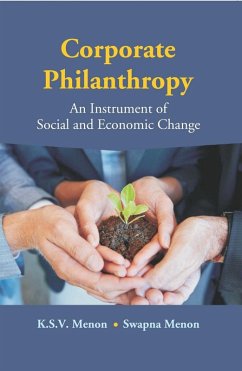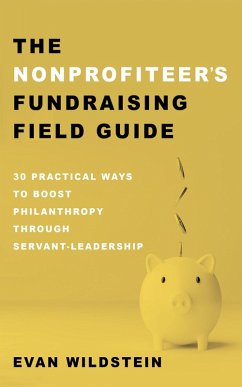Derived from the Greek "philanthropos" and Latin "philanthropia", the term "philanthropy" literally translates as "love of humanity", or "useful to mankind". First coined by the fifth century BC playwright Aeschylus in Prometheus Bound, the modern concept of philanthropy took shape in the eighteenth and nineteenth centuries, and became a very fashionable activity among British and American traders and entrepreneurs. Often implemented as a component of corporate social responsibility (CSR) programs, corporate philanthropy (CP) today is a way for businesses to give back to local, national or even international communities, via charitable donations to nonprofit organizations. This "giving back" can take the form of financial (cash) donations or non-cash contributions such as time, expertise, or tangible (inkind) goods. In chapter 1 an attempt has been made to trace and discuss various aspects of corporate philanthropy and its varied dimensions. These include the motivations for corporate philanthropy, potential benefits for implementing firms, and examples of societal impacts. In chapter 2 we have traced various elements which spurred greater interest in philanthropy in India. A number of studies have sought to quantify, analyze and promote such giving. It is a planned intervention that seeks to attain a specific impact over a period of time. The history of giving in India, with a few notable exceptions, has been largely non-strategic and religious in nature. As stipulated in the Section 135 of the Companies Act, companies having a net worth of INR 500 crore (Cr.) or more, a turnover of INR 1000 Cr. or more, or a net profit of INR 5 Cr. or more in a given financial year are required to spend 2 percent of their average net profit (of previous three years) on CSR programmes. Indian companies responded well to the mandatory CSR with almost INR 8800 Cr. CSR spend in the 1st reporting year of the CSR compliance. The Act heralded a new era for the development of corporate philanthropy in India. The latest proposal in the 2019 budget for setting up social stock exchange will also boost the base for philanthropic activities. In the budget speech of 2019, Finance Minister has proposed to initiate steps towards creating an electronic fund raising platform a social stock exchange under the regulatory ambit of Securities and Exchange Board of India for listing social enterprises and voluntary organisations working for the realisation of a social welfare objective so that they can raise capital as equity, debt or as units like a mutual fund". This will provide further boost to the philanthropic ecosystem. The authors believe with a growing economy and rising wealth, the role of domestic private philanthropy becomes increasingly important. Both domestic corporations and Indian ultra high net worth individuals need to enhance the level and nature of their giving. Many resourceful and gracious women in India and globally are coming forward to support philanthropic activities directed at vulnerable sections of society. In the past thirty years women's philanthropy has emerged as a distinct movement using innovative and creative ideas to improve local, national and global communities. Women are engaged in philanthropy from many perspectives as donors, as professionals, as fundraisers, as nonprofit leaders in both formal and informal networks. Chapter 3 discusses in detail various aspects of women philanthropists. Some of well known women philanthropies in India and abroad have been listed therein. These include Nita Ambani, Kiran Mazumdar-Shaw, Kiran Nadar, Rohini Nilekani, Melinda Gates, Susan Buffett, Susan Dell, Pam Omidyar etc. These are only indicative not exhaustive of such women donors. Giving in itself is a noble act regardless of the motivation or approach. It can be one of the most personally rewarding experiences. However, the seriousness, scale and complexity of India's social problems require philanthropists to go beyond personal satisfaction. An appropriate strategy and deeper thinking are required to tackle effectively and systematically varied problems facing the community. Chapter 4 pinpoints some of the issues and the strategies warranted to mitigate them. Major conclusions and findings have also been presented therein. It may be mentioned that well before the introduction CSR rules in the company's act many known corporate entities like Tata's were very active and liberal in supporting philanthropic endeavors in different fields like healthcare, education, Rural upliftment, Poverty Alleviation, Farmers welfare etc. A unique feature of our effort is to bring to focus the role of major corporate philanthropists. They include Tata Trust, Reliance Foundation, Shiv Nadar Foundation, Azim Premji Foundation, ITC Limited, Piramal Foundation, Birla Foundation, Vedanta Foundation, Hinduja Foundation etc. However it may be mentioned that the list is not complete and only indicative. An attempt has been made to discuss their areas of contribution, like education, healthcare, rural development, poverty alleviation etc. We feel the case studies will be found useful to those firms which are moving towards setting up of foundations for philanthropy and academics and others in developing an appropriate corporate philanthropic framework in the country.
Dieser Download kann aus rechtlichen Gründen nur mit Rechnungsadresse in A, B, BG, CY, CZ, D, DK, EW, E, FIN, F, GR, HR, H, IRL, I, LT, L, LR, M, NL, PL, P, R, S, SLO, SK ausgeliefert werden.









